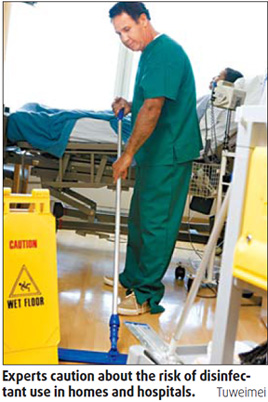Disinfectants making bugs drug-resistant
(China Daily)
Updated: 2009-12-31 09:46
 |
Large Medium Small |
Disinfectants commonly used in homes and medical facilities can boost the resistance of some bacteria to life-saving antibiotics, according to a new study.
The findings shed light on how at least one pathogen - Pseudomonas aeruginosa - spreads, and could apply to other hospital superbugs as well, the authors say.
P. aeruginosa, responsible for one-in-10 hospital-acquired infections, is a so-called "opportunistic" bacteria that attacks people with weakened immune systems. It typically infects the pulmonary and urinary tracts, as well as burns and puncture wounds.
"This is very, very worrying," says Gerard Fleming, a professor at the National University of Ireland in Galway, and main architect of the study.

In laboratory experiments, researchers showed that the bug can rapidly mutate, building resistance to progressively higher doses of a disinfectant known as BSK, or benzalkonium chloride. Safe for humans, BSK is widely used in cleaning and disinfecting products to kill bacteria, fungi and algae.
The DNA-altered bacteria were able to withstand concentrations of BSK up to 400 times greater than the non-mutated strain.
More critically, they also developed a resistance to an antibiotic, ciprofloxacin, even though they had never been exposed to the drug.
Ciprofloxacin is a front-line medication in the fight against several bacterial infections, and is also the drug of last-resort against the deadly disease anthrax.
"We found that in both cases - for the disinfectant and the antibiotic - the (mutated) bacteria was taking them in, but expelling them just as quickly," Fleming says. "It would be like trying to pump air into a bicycle tire with a huge hole in it."
The disinfectant-resistant strain of P. aeruginosa built up immunity against ciprofloxacin up to 10 times more effectively than did the baseline bacteria, the study reports.
In further experiments, Fleming and colleagues put the two strains together in an environment containing a diluted dose of disinfectant, such as might be found in a hospital or home.
The mutated bugs were "highly competitive" with the non-mutated ones, says Fleming: "They outgrew the so-called 'sensitive' strains so rapidly it was hard to believe."
"That means we have a problem - disinfectant may proliferate antibiotic resistance," he adds.
Fleming hastens to add that this did not mean that disinfectants should not be used at all.
"They are quite important as a first-line defense. The message is to use them properly - don't water them down to concentrations where they are no longer effective," he says.
?